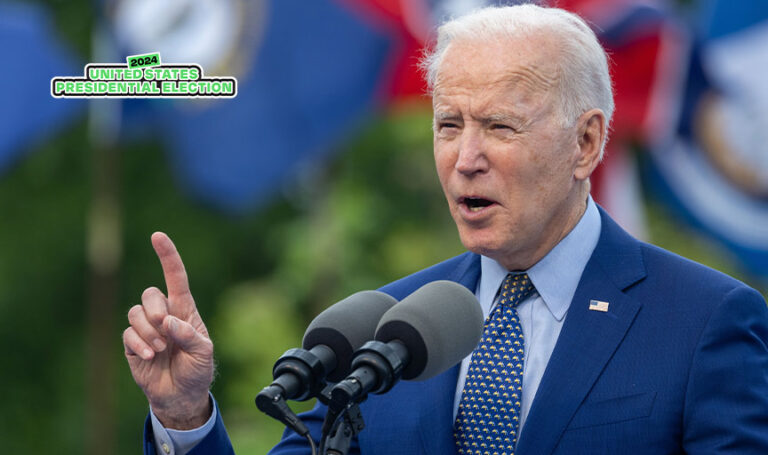Biden’s resistance to ceasefire could alienate gen Z voters and Trump’s Thanksgiving rant

We’re back again for the third instalment of our 2024 US presidential election weekly recaps. Following our second summary—make sure to check it out here—this week’s column will focus on incumbent Joe Biden’s gen Z voter woes, perpetual troublemaker Donald Trump’s latest legal attack, and the possible polarisation that might come with parallel impending US and UK national elections. Let’s get into it.
Joe Biden’s resistance to call for a ceasefire in Gaza is alienating gen Z voters
The Israel-Hamas war has dominated news headlines for weeks. Gaza has been destroyed to such a point that health officials are no longer able to deliver an accurate death toll. The most recent figures, however, suggest that the number is well above 11,000. Today, 24 November 2023, Hamas announced that it would be releasing 50 of the roughly 240 Israeli hostages amid a four-day truce and humanitarian pause. However, it’s expected that following this short pause, the war will continue.
While many nations across the world have been calling for an immediate ceasefire, the US has stood firmly in the position that a ceasefire would not result in “peace” and rather Palestine and Israel should seek a long-term two-state solution. President Biden has also continued to reiterate that not only should Israel continue to “defend itself” but that the IDF’s military attacks are starkly different to the tactics used by the terrorist organisation Hamas, as reported by The Independent.
This rhetoric has unsurprisingly massively damaged Biden’s relationship with young voters. In fact, earlier in November, several progressive gen Z groups, including March for Our Lives, Gen-Z For Change, and the Sunrise Movement penned an open letter to Biden emphasising how the US administration’s stance on Palestine will force millions of young voters to either stay home or vote elsewhere.
In the letter, they reference a recent poll which showed that young voters are deeply disturbed by Biden’s position on the war, citing that among voters under 35, 65 per cent oppose “sending more military aid to Israel and only 22 per cent approve of Biden’s handling of the Israel-Hamas war.”
Many commentators are wondering if this backlash might be prompting Biden’s campaign team to join TikTok, in a seriously Boomer attempt to win back gen Z voters. Think people will see straight through that, but okay.
Donald Trump launches new attack on Justice Arthur Engoron in Thanksgiving post
Trump has, once again, unleashed his anger on those put in charge of holding him to account. Over the US holiday, the former President posted on his social media platform Truth Social and, as reported by multiple news outlets, completely went in on those behind the ongoing fraud case he’s facing.
Trump wrote: “Happy Thanksgiving to all, including the Racist & Incompetent Attorney General of New York State, Letitia ‘Peekaboo’ James, who has let Murder & Violence Crime flourish, & Businesses FLEE; the Radical Left Trump Hating Judge, a ‘Psycho,’ Arthur Engoron, who Criminally Defrauded the State of New York, & me, by purposely Valuing my Assets at a ‘tiny’ Fraction of what they are really worth in order to convict me of Fraud before even a Trial, or seeing any proof, & used his Politically Biased & Corrupt Campaign Finance Violator, Chief Clerk Alison Greenfield, to sit by his side on the ‘Bench’ & tell him what to do.”
This, of course, is not the first time Trump has gone after the individuals working on the ongoing fraud case. In fact, the problems had grown to such a point that the judge actually imposed a gag order on Trump, in order to try and stop him from outrightly attacking the judge’s staff. The order was later paused after Trump’s team appealed it as “unconstitutional.”
Arguing to reimpose the gag order, court officials have provided evidence of how Trump’s online rhetoric had resulted in a series of highly offensive and dangerous threats being targeted at the judge’s clerk.
Parallel US and UK elections could seriously put democracy at risk
A recent article published in the Financial Times has detailed how having the UK general election and the US presidential election both take place next autumn might cause dangerous levels of political instability and online manipulation.
Fake news and misinformation have become highly prevalent over the past decade—especially during election times. With polarisation already at peak levels, and AI and deepfakes on the rise, it’s likely that social media platforms will have to combat the spread of all kinds of untruths. As relayed by the article’s author Ben Ansell, “Parallel US and UK elections create double the opportunity for cyber espionage and provocateurs from hostile countries deploying misinformation.”
Let’s just say that 2024 is going to be an especially busy year for global intelligence agencies.





